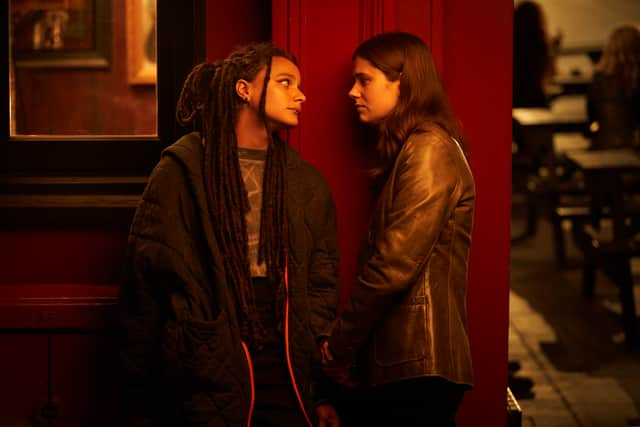Conversations With Friends review: BBC Three adaptation of Sally Rooney’s novel is dull and flat and lifeless
and live on Freeview channel 276
There are things an author can achieve in prose that aren’t easily replicated by a television adaptation. In Sally Rooney’s novel Conversations with Friends, asking for a glass of water can be prefaced with reams of self-doubt, hesitation and practised excuses, all part of an internal monologue that contradicts itself and argues back. In director Lenny Abrahamson’s television adaptation, the same request needs to convey that same level of meaning with an unmet glance and a tentative expression.
That isn’t to say one medium is superior to the other on some fundamental level – that oft-cited cliché “the book is always better” is only ever coincidentally true – but just to draw a distinction between them. It’s equally true that there are some things that television can do that prose can’t. In the case of Conversations With Friends, though, it feels that the story lost something when translated away from prose, without gaining anything by virtue of being television.
Advertisement
Hide AdAdvertisement
Hide AdConversations with Friends is about Frances (Alison Oliver), Bobbi (Sasha Lane), Nick (Joe Alwyn) and Melissa (Jemima Kirke). Frances and Bobbi are students, best friends, and ex-girlfriends; Nick and Melissa are a decade older than them, wealthier, and married. They’re all creative types – Frances and Bobbi are spoken-word poets, Nick a slightly faded actor, Melissa a successful essayist with a new book on the way – and it’s this that draws them together in the first place. An early fascination between Frances and Nick soon gives way to a burgeoning affair, complicating Frances’ friendship with Bobbie and straining Nick’s marriage to Melissa.
The affair doesn’t exactly break new narrative ground, and even someone with fairly little familiarity with the story could guess its major turning points and tensions with ease. What matters is the voice it’s told in, the details that inform it and make it distinct – or, at least, that’s what should matter. Stripping out that narrative voice to translate the show to television blunts that specificity, leaving this adaptation of a novel, which in some ways is more ambitious than Normal People, feeling decidedly generic and bland.


The cast are each in their way playing quite implacable characters, introspective and deliberately withholding; where the book can sit in the gap between self-perception and self-expression, the television series struggles to find a way in. Alison Oliver is a highlight – best as a still point in more intense moments – and Sasha Lane is memorably brash from the margins, but across most of the series the ensemble struggles to coalesce.
More damning is that Oliver and Joe Alwyn (who makes the convincing if inadvertent case here that he should focus on songwriting full time) have essentially minimal chemistry together, less a burning fascination and more of a polite mutual affinity. Occasional sparks fizzle out quickly, and the affair becomes that much less animated, leaving the show feeling dull and flat and lifeless. What should be the spine of the series becomes a huge absence at its core, and it’s not really a surprise that the series falters and stumbles.
Advertisement
Hide AdAdvertisement
Hide AdIt feels like the television adaptation has sanded down and simplified the book’s spikier details, which could have created a structure around Oliver, Alwyn, Kirke, and Lane to give them something to grab onto and centre their performances around. It’s not a surprise, but it is disappointing, that Conversations With Friends laughs off Frances’ communism with an early joke, stripping out a huge detail that informs the relationships of the book. Disparities in wealth – between Frances and Bobbi, between Frances and Nick, between Frances and Melissa – are only glanced over here, and it’s a shame that something so key to a Marxist author’s work has been airbrushed out of this high-profile adaptation.
Ultimately, Conversations With Friends struggles to be the most complex, most interesting version of itself. That’s only very rarely a problem for television shows, because you can never quite be sure that the version you’re imagining would actually work the way you hope - Conversations With Friends just suffers the particular misfortune that a better version of it already exists, printed and bound in paperback.
Conversations With Friends starts on BBC Three at 10pm on Sunday 15 May, with all twelve episodes available to watch as a boxset on BBC iPlayer immediately afterwards. I’ve seen all ten episodes that were made available to me before writing this review.
Comment Guidelines
National World encourages reader discussion on our stories. User feedback, insights and back-and-forth exchanges add a rich layer of context to reporting. Please review our Community Guidelines before commenting.
